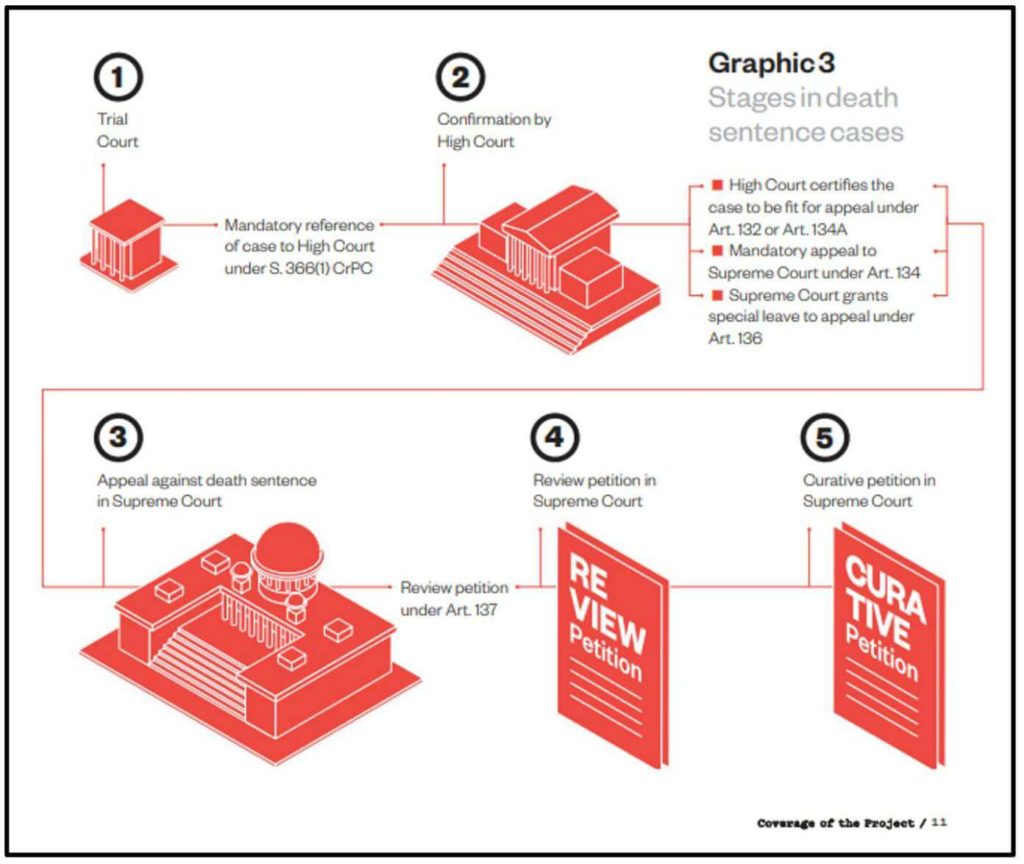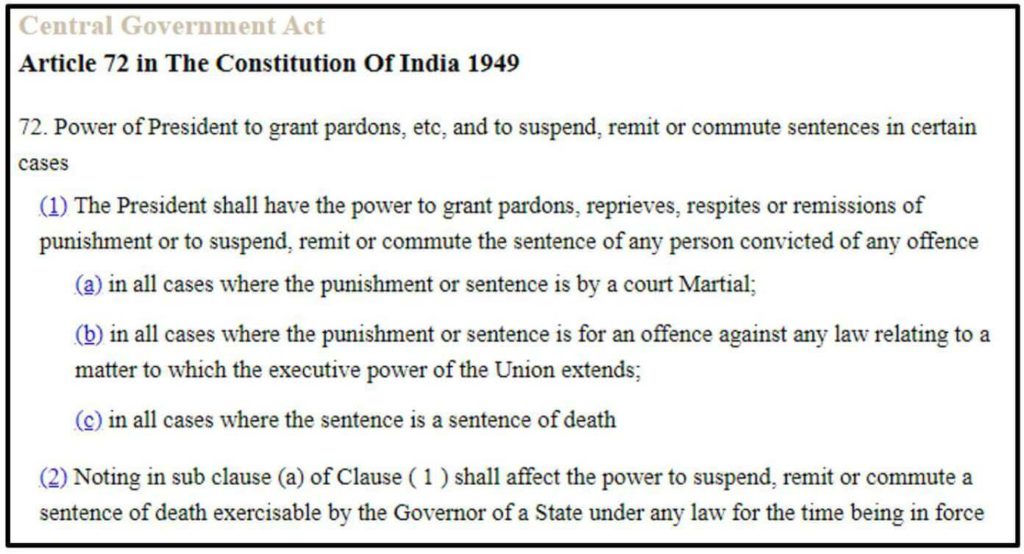[orc]The four convicts in the Nirbhaya case were finally executed a few days ago. The execution took place 6 years after the fast track court awarded the death sentence. But what are the reasons for such a delay in the execution of death sentence? Here is a detailed explainer.
After more than seven years since the barbaric gang rape of a 23-year-old paramedic student, the four convicts were executed in the early hours of 20 March 2020 at Tihar Jail. They had left no stone unturned to save themselves from execution. Though they were awarded death sentence by a fast track court in September 2013, it took more than 6 years for the death sentence to be executed. But what are the reasons for such a long delay in the execution of death sentence? Here is a detailed explainer. `
Capital punishment has always been a controversial issue in India and other countries as well. Generally, capital punishment is awarded in the rarest of rare cases related to rape, murder, terrorism, and atrocities towards Scheduled Castes and Scheduled Tribes in India. According to National Law University’s annual report published in 2016, there are 59 sections in 18 central legislations which cite death penalty as a possible punishment. 12 of these sections are covered under the Indian Penal Code. In the Law Commission of India’s report on Death Penalty in 2015, it was stated that there were 12 crimes under IPC and 22 other laws which prescribed death penalty. Later, in 2019, the NDA government amended the POCSO Act in order to grant death penalty to those who indulge in aggravated sexual assault against children.
High Court’s confirmation is mandatory for execution of death sentence
Usually, the trials of these rarest of rare cases take place in the Sessions Court or Trial Court or a designate fast track court or a special court where, based on the severity of the offence, the court can pronounce death penalty to the convict. It is mandatory under Section 366 (1) of Code of Criminal Procedure (CrPC) that the High Court confirms the sentence before issuing a death warrant. This is not applicable to those central legislations such as the Air Force Act 1950, Army Act 1950, Assam Rifles Act 2006, ITBF Act, 1992, etc. which are excluded from the CrPC.

The Constitution gives convicts the option to approach SC challenging HC’s decisions
The convict who is awarded the death sentence has the option to approach the Supreme Court challenging the High Court’s decision as per Articles 132, 134 and 136 of Indian Constitution. Following the Supreme Court’s decision, the convict can file review petition under Article 137. If the review petition is dismissed by the Court, then they can file a curative petition to reconsider the decision.

Mercy Petition can be filed with the President or State Governor for commutation
Once capital punishment has been finalized by either of the courts, the convict can file a request for pardon or mercy petition with the President of India (Article 72) or the Governor of the state (Article 161) stating reasons such as age, health, and law. The President or Governor disposes of the petition based on the recommendations of state government and sanction of the Home Ministry. Both the President and Governor can grant pardon, reprieve, respite or remission of punishment or suspend, remit or commute the convict. However, both of them must reject the mercy petition for the execution to take place. Further, the convict can file a petition with the Supreme Court questioning the President’s decision in the case of mercy petition. Once this petition is disposed, death sentence is executed.

Convicts can file up to four petitions
A convict can, therefore, file up to four petitions. This provision has been granted to convicts in order to ensure that the decision made is not hasty. The procedure gives enough checks and balances in the course of trial so that no innocent person should be convicted.
Capital punishment is to be awarded only in the rarest of rare cases
In Bachan Singh Vs State of Punjab 1982, the Supreme Court stated that capital punishment was to be given in only ‘rarest of rare’ cases. Supreme Court upheld the constitutionality of death penalty in this case. The need for this doctrine was to reduce the ambiguity in the kind of cases in which death penalty was to be awarded. In this case, it was further stated that both aggravating circumstances (why should the punishment be severe) and mitigating circumstances (why should punishment be lessened) were to be considered by the court before arriving at the final decision.
Execution in the Nirbhaya case took place 6 years after the judgment
On 16 December 2012, a 23-year-old girl who was returning from a movie with her friend was brutally gang-raped in a bus in the national capital. Her friend was also attacked. The incident resulted in nation-wide uproar on women safety in India. On 29 December 2012, Nirbhaya succumbed to the injuries in Singapore while undergoing treatment.
A total of six men were accused of the crime. One was a juvenile at the time of incident and was sent to juvenile correction home for three years. Another accused Ram Singh allegedly committed suicide in Tihar Jail in 2013. The remaining four convicts, Mukesh Singh, Pawan Gupta, Vinay Sharma, and Akshay Kumar Singh were hanged to death on 20 March 2020. What made this case more complicated is that all the convicts were to be executed together. This delayed the process further. As long as any one convict’s petition was under scrutiny, others were also safeguarded by default. Each convict has the option to file petition four times and there were four convicts in this case.
The Timeline of the Nirbhaya case
Date | Event |
Fast Track Court awarded death penalty to all four convicts | |
13 March 2014 | Delhi High Court upheld the death penalty |
05 May 2017 | SC upheld the death penalty |
08 November 2017 | Mukesh files review petition in SC |
Vinay and Pawan moved to SC for reviewing its verdict | |
09 July 2018 | SC dismissed all three review petitions |
10 December 2019 | Akshay filed review petition |
18 December 2019 | Akshay’s review plea dismissed |
07 January 2020 | Death warrant issued for 22 January 2020 |
08 January 2020 | Vinay filed curative petition |
09 January 2020 | Mukesh filed curative petition |
14 January 2020 | Both curative petitions were dismissed and Mukesh files mercy petition |
17 January 2020 | Death warrant issued for 01 February 2020 |
Writ petition against mercy petition filed by Mukesh | |
29 January 2020 | Writ petition rejected, Akshay files curative petition and Vinay files mercy petition |
30 January 2020 | Curative petition dismissed |
31 January 2020 | Akshay filed mercy petition |
01 February 2020 | Mercy petition rejected |
05 February 2020 | Akshay’s petition dismissed |
11 February 2020 | Vinay proceeded with writ against mercy petition |
Vinay’s petition dismissed | |
17 February 2020 | Death warrant issued for 3 March 2020 |
28 February 2020 | Pawan filed curative petition |
02 March 2020 | Pawan’s curative petition dismissed, filed mercy petition |
04 March 2020 | Mercy petition rejected |
05 March 2020 | Death warrant issued for 20 March 2020 |
20 March 2020 | EXECUTED |
Government amended ‘Criminal Law’ making definition of rape broader and increasing punishment
After the gruesome 2012 incident, following public outcry, the government amended Criminal Law (Amendment) Act, also referred to as Nirbhaya Act, in 2013. Through the amendment, definition of rape was made broader and punishment more stringent as per J S Verma Committee’s recommendation in 2013. The amendment provided for death penalty in rape cases that result in death of victim or puts her in a vegetative state. Furthermore, punishment for gang-rape was doubled from 10 years to 20 years and up to life imprisonment. The law also included other acts such as voyeurism, stalking, passing sexual remarks, unwelcome physical contact, gestures, and showing pornography against will as crimes.
Nirbhaya fund was announced in 2013 Union Budget
Nirbhaya fund was launched by the Centre to bolster women safety across the country. This fund was to be used by states for improving infrastructure such as installation of CCTV and streetlights and other projects aimed at women safety. Factly’s article on the status of utilization of the Nirbhaya fund can be read here.
Juvenile delinquency law amended in 2015
Juvenile delinquency law in India was also amended in 2015 to allow trial of children between 16-18 years as adults for heinous crimes. Juvenile Justice (Care and Protection) Act was modified with the intention to act as deterrent for children committing heinous crimes. Here, heinous crimes are those which have a minimum punishment of 7 years’ imprisonment under any law. For example, rape and murder are heinous offences in India.
Only four people were executed between 2000 and 2018 in India while close to 2500 were awarded death sentence
Capital punishment has once again become a topic of debate following the execution of the four convicts in this case. Since the beginning of this millennium, a total of 2493 people were awarded capital punishment as per the National Crime Records Bureau’s data as on 31 December 2018. However, only four were executed at the time of release of data. Including the latest executions, a total of eight convicts have been executed since 2000. The Law Commission of India had recommended that death penalty be abolished in all cases except terrorism and waging war.



1 Comment
Pingback: Why are the reasons for delay in the execution of Death sentence? – Go Corona